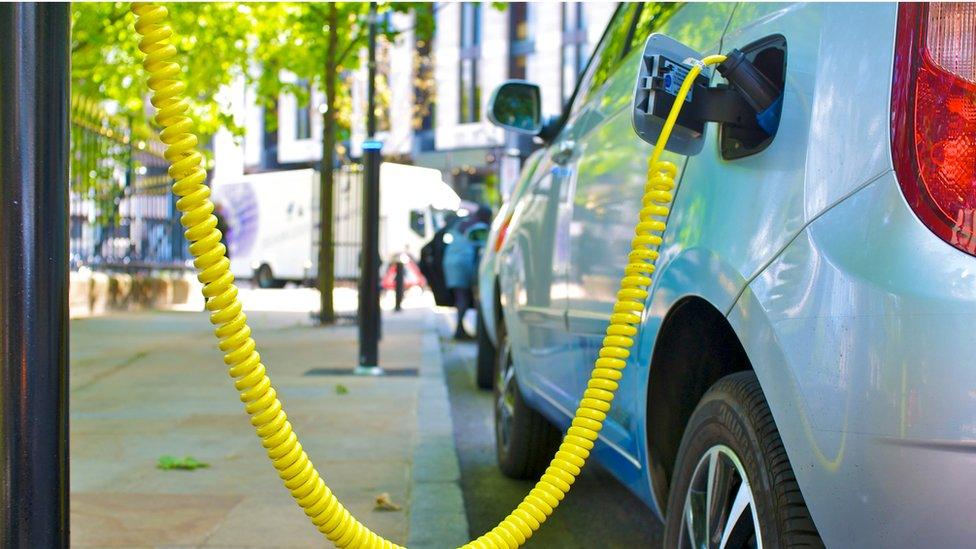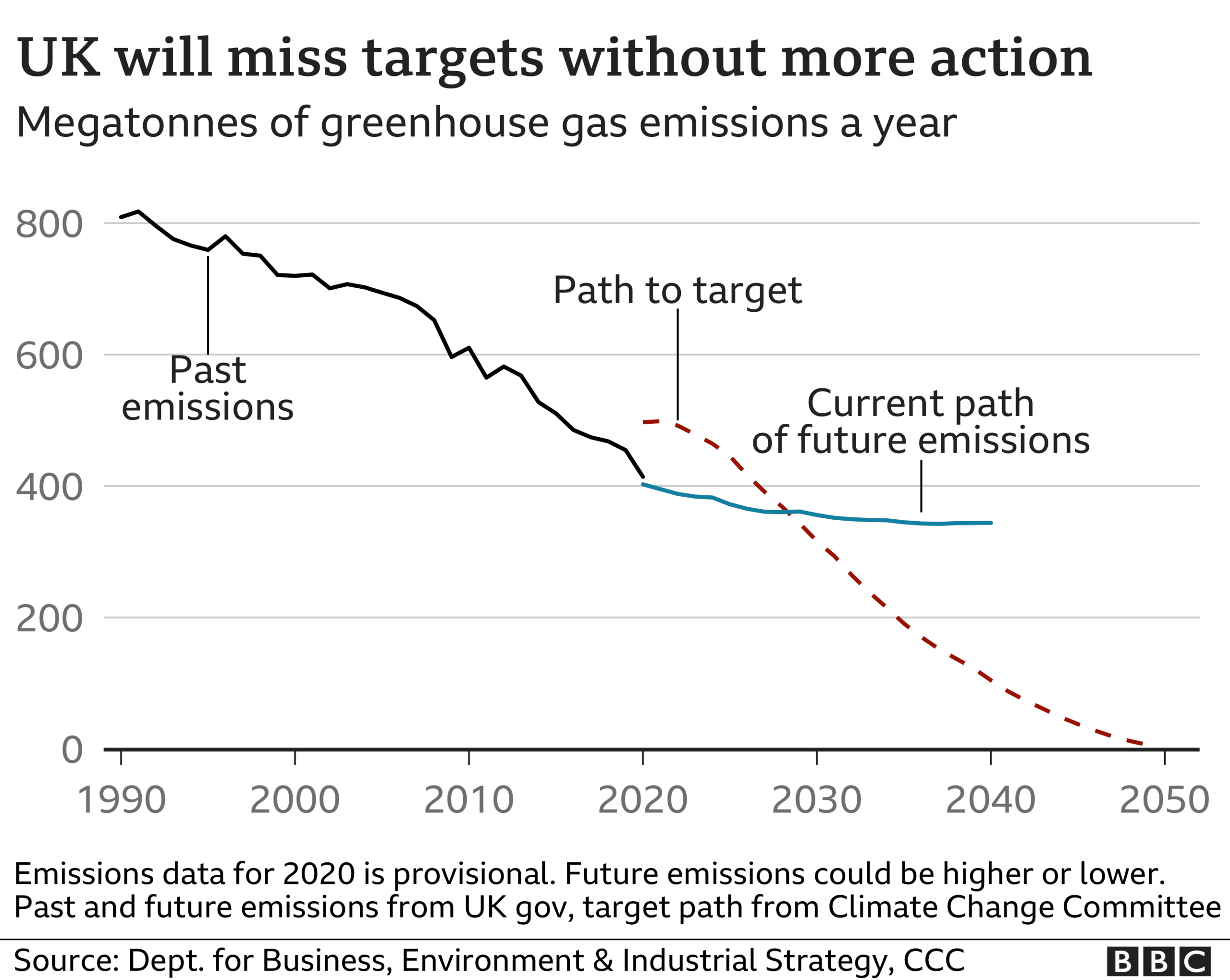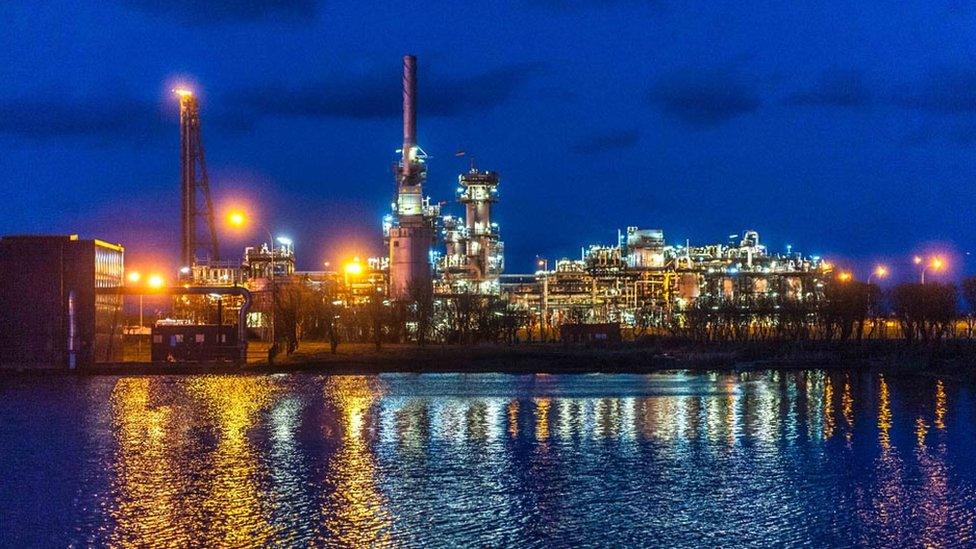Net zero announcement: UK sets out plans to cut greenhouse gas emissions
- Published
- comments

Another big push towards electric vehicles is being made in the UK government's latest strategy to make the great shift to a virtually zero-carbon economy.
Ministers are investing £620m in grants for electric vehicles and street charging points.
Car makers will be mandated to sell a proportion of clean vehicles each year.
An extra £350m is promised to help the automotive supply chain move to electric.
The new plan set out by the government, external is supposed to dramatically reduce greenhouse gas emissions to reach a target of net zero by 2050.
The announcement comes 12 days before global leaders meet in Glasgow to negotiate how to curb climate change.
Achieving net zero means the UK will no longer be adding to the total amount of greenhouse gases in the atmosphere.
Without action on climate change, the world faces a hotter planet, rising sea levels and extreme weather that threaten many forms of life.
The UK has already made progress in cutting emissions compared to the levels released in 1990. In 2019, the country released 40% less than in 1990.
On Tuesday the government also announced a strategy to address emissions from the UK's 30 million buildings.
Homeowners will be able to apply for grants of up to £5,000 to install low-carbon heat pumps to replace gas boilers.
The Labour party's Ed Miliband responded to the strategy, saying the "plans falls short on delivery" adding "we've waited months for a heat and buildings strategy, it's a massive let-down".
Prof Lord Nicholas Stern, Chair of LSE's Grantham Research Institute on Climate Change and the Environment, said the plan will require "strong investment and innovation" and would generate a "new and attractive form of growth". But he warned that low-income households will need support.
And Prof Dan Lunt, Professor of Climate Science at University of Bristol, called the strategy's approach to flying weak and unambitious.
Environmental group Friends of the Earth criticised the strategy as "riddled with holes and omissions".
"The rapid electrification of new vehicles is certainly welcome, but many of the carbon savings this could bring will be wiped out by the government's £27 billion road programme," it said.
What does the net zero plan say?
It also offers a further £120m to develop SMRs - small "modular" nuclear reactors that can be factory-built. These might go to the Wylfa site in Wales, although that's not certain.
These mini-reactors are being promoted heavily by Rolls Royce, although critics say the technology won't be mature in time to meet the UK's carbon targets.
On large nuclear: there's been much speculation about a go-ahead for Sizewell C in Suffolk. But funding has been a key sticking point and it seems an announcement has been put off until the Chancellor's spending review next week.
There will be an extra £625m for tree-planting and peat restoration, too - even though the current schedule is running way behind its targets.
The government is committing £140m to two clusters promoting carbon capture and storage to produce hydrogen. The hubs will be the North-West of England and North Wales, with Teesside and Humberside - the government has previously promised £1bn to support CCS.


Heavy industries in these areas will be fuelled by hydrogen split from natural gas. The resulting CO2 emissions will be pumped into undersea rocks for storage.
This will be controversial because environmentalists believe hydrogen should be obtained instead through electrolysis - using surplus wind energy.
It looks unlikely that there will be much hydrogen left over to heat people's homes, which is why the government is postponing any decision about hydrogen boilers until 2026.
The Treasury has hinted tax rises may be necessary to fund the government's net zero strategy.
In a review exploring the economic impact of decarbonising, external, the Treasury said: "There will be demands on public spending, but the biggest impact comes from the erosion of tax revenues from fossil fuel-related activity."
It said future governments "may need to consider changes to existing taxes and new sources of revenue" rather than relying on higher borrowing.
Ministers are keen to stress their intention that the so-called net zero transition will be led by business.
They say it will create 440,000 jobs and draw in up to 90bn of private investment by 2030.
The government says since the Prime Minister announced his 10-point plan for the climate a year ago, it has invested £26bn of public funds into the low-carbon revolution.
Part of that portfolio will be an extra £500m fund for low carbon innovation.
Environmentalists will be scrutinising the numbers to see if various recent policy announcements will add up to the policy portfolio needed to present a plausible plan for decarbonising the economy by 2050.
So what's missing from the strategy? Well, there's no reference to eating less meat - which the government's advisers say is needed. And the aviation strategy - putting no constraint on flying - runs counter to advisers' opinions.


The COP26 global climate summit in Glasgow in November is seen as crucial if climate change is to be brought under control. Almost 200 countries are being asked for their plans to cut emissions, and it could lead to major changes to our everyday lives.

- Published19 October 2021

- Published19 October 2021

- Published11 November 2021
